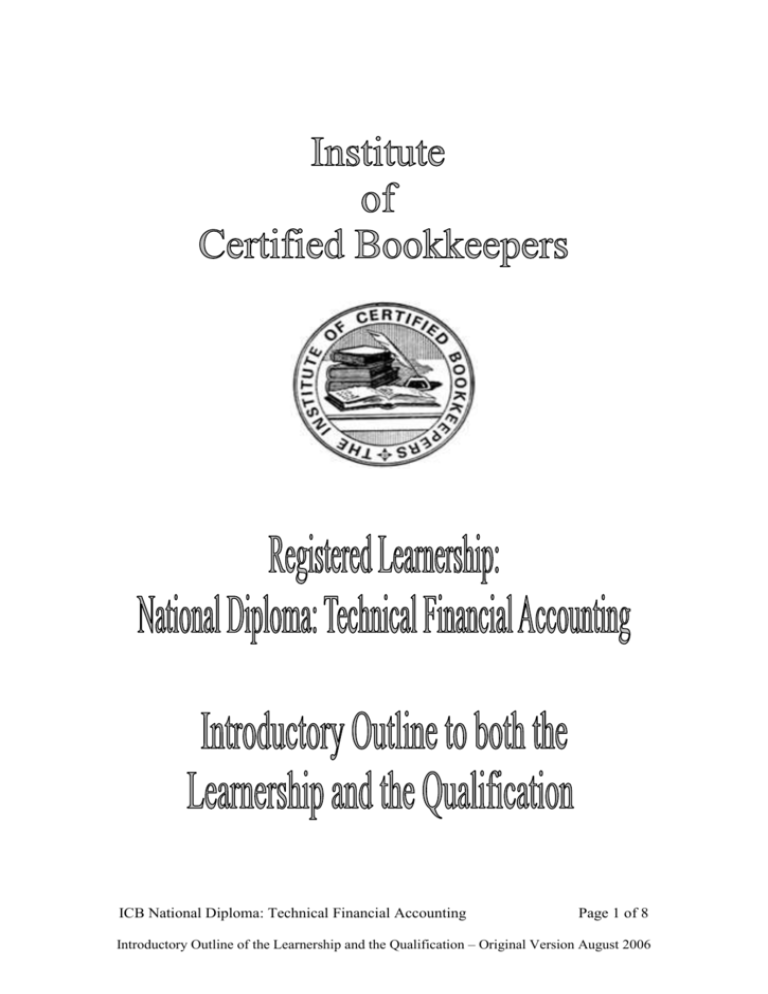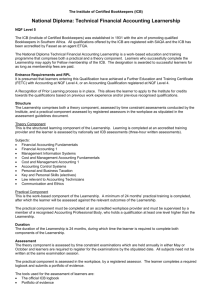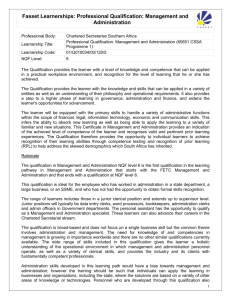ICB NDTFA Learnership
advertisement

ICB National Diploma: Technical Financial Accounting Page 1 of 8 Introductory Outline of the Learnership and the Qualification – Original Version August 2006 REGISTERED LEARNERSHIP FASSET LEARNERSHIP CODE 01/Q010022/28/251/5 SAQA QUALIFICATION ID 36213 NATIONAL DIPLOMA: TECHNICAL FINANCIAL ACCOUNTING PURPOSE OF THE LEARNERSHIP AND THE QUALIFICATION The National Diploma: Technical Financial Accounting (NQF level 5) is administered by the Institute of Certified Bookkeepers and is a registered Fasset learnership as well as a qualification. The qualification (NQF 5) is obtained by full-time or part-time study through an ICB accredited training provider and assessment by examination through the ICB. It can also be obtained through a ‘recognition of prior learning’ process (RPL). The learnership (NQF 5) can only be obtained through registration of the learner with Fasset and the ICB, followed by structured training and practical experience at an accredited workplace (employer). This practical experience must be supervised by a mentor and assessed by a registered ICB assessor using the ICB Assessment Record, Training Record/Logbook and Portfolio of Evidence. This qualification/learnership is designed to equip the learner with the knowledge, skills, attitudes and values to be appointed as a Financial Accounting Technician. Accounting Technicians have an important role to play, either as support staff to the Accountant, where they provide accounting and financial management support in the field of accounting and financial management in medium to large organisations, or by assuming the role of Accountant in a smaller organisation, where an outsourced registered Professional Accountant may provide the service of supervision and monitoring. It is also for individuals who, for whatever reason, are unable to continue or do not wish to continue with their NQF level 6 or 7 accounting studies. Financial Accounting Technicians are in very short supply, as all organisations need to be provided with the type of work they do. This diploma can also be seen as a first qualification in a long line of accounting qualifications offered by a wide range of professional accounting bodies and tertiary institutions at various levels on the NQF. Successful completion of this qualification/learnership will give the learner the knowledge and skills required not only to perform his/her accounting job efficiently, but also to proceed on a path of life-long learning with one of the further qualifications at NQF level 6 and/or 7. ICB National Diploma: Technical Financial Accounting Page 2 of 8 Introductory Outline of the Learnership and the Qualification – Original Version August 2006 LEARNING ASSUMED TO BE IN PLACE It is presumed that learners entering this qualification will have achieved an NQF level 4 qualification with accounting as a subject, or an accounting qualification registered at NQF level 4. RECOGNITION OF PRIOR LEARNING The qualification may be obtained in whole or in part through a process of RPL. Recognition of prior learning means the comparison of the previous learning of a learner, however obtained, against the learning outcomes required for this qualification in terms of the Specific Outcomes of the constituent Unit Standards and the Exit Level Outcomes of the qualification as a whole. The learners will then be credited with the knowledge, skills and competencies already mastered for each Unit Standard and may even be awarded with the complete qualification. A learner requesting RPL should contact the ICB for their specific RPL regulations and will be expected to present evidence that the relevant outcome/s have been covered to the required level/s. However, RPL can only apply in the case of the qualification and cannot apply to the learnership. EXIT LEVEL OUTCOMES The qualifying learner will be able to: 1. Financial Accounting Fundamentals: Record income and receipts Make and record payments Prepare ledger accounts and an initial trial balance. 2. Financial Accounting: Maintain financial records and prepare ledger accounts Draft financial statements for various business entities Prepare financial reports and returns. 3. Management Information Systems: Work with information technology in an accounting environment Produce spreadsheets using information technology in an accounting environment. 4. Cost and Management Accounting Fundamentals: Supply cost information for management control Record, analyse and prepare cost information. 5. Cost and Management Accounting: Contribute to the management of costs and the enhancement of value Recognise, measure, classify and record financial and non-financial data. 6. Accounting Control Systems: Contribute to the implementation of auditing procedures Manage accounting systems Recognise, measure, classify and record financial and non-financial data Operate a cash management and credit control system. ICB National Diploma: Technical Financial Accounting Page 3 of 8 Introductory Outline of the Learnership and the Qualification – Original Version August 2006 7. Personal and Business Taxation: Determine what is taxable income Prepare business tax returns Prepare personal tax returns Interpret and apply the laws and procedures relating to taxes levied Interpret and apply the laws and procedures relating to the duty levied on the estates of deceased persons. 8. Law relevant to Accounting Technicians: Interpret statutes and provide basic information on South African Legislation as it relates to the accounting function. 9. Key and Personal Skills (any two of the following three): Achieve personal effectiveness in an accounting environment Administer and wind up the estates of deceased persons Administer and wind up insolvent estates. 10. Communication and Ethics: Apply workplace communication skills Demonstrate an understanding professional values and ethics Analyse and communicate workplace data. The above 10 items in bold text are the 10 Learning Areas for the Qualification (10 subjects that will be assessed by the ICB during their national examinations conducted in May and October/November annually). The 28 bulleted items above are the 28 Unit Standards for the Learnership (of which each learner must select 27). Workplace assessments must be conducted individually by a Fasset and ICB registered assessor with each learner as required. Full details of all the above outcomes and all the associated assessment criteria are included in the following related ICB publications: 1. ICB NDTFA ‘Assessment Record’ (including the Assessment Guide) 2. ICB NDTFA ‘Practical Training Record’ (the Training Logbook) 3. ICB NDTFA ‘Summarised SAQA Unit Standards Booklet’. INTERNATIONAL COMPARABILITY This qualification, especially the accounting outcomes, compares favourably with all international qualifications in accounting at this level as accounting follows international accounting standards. CAREER DEVELOPMENT Competent learners (from either the qualification or learnership route) will be able to apply for Fellowship membership of the Institute of Certified Bookkeepers and will then be entitled to use the designation FICB (SA). This qualification also articulates vertically with the following qualifications: CIMA ACCA CIS CFA (SA) ICB National Diploma: Technical Financial Accounting Page 4 of 8 Introductory Outline of the Learnership and the Qualification – Original Version August 2006 LEVELS, CREDITS AND LEARNING COMPONENTS Both the qualification and the learnership consist of a planned combination of learning components that will equip the learner with the knowledge, skills, attitudes and values required of an Accounting Technician. The Unit Standards making up the qualification and the learnership have been grouped together as Fundamental, Core and Elective Components making up a total credit value of 251 credits. Fundamental Component (19 credits): Three Unit Standards at NQF Level 5 in Communication and Ethics to the value of nineteen credits have been included. All the Unit Standards in the Fundamental Component are compulsory. Core Component (216 credits): Twenty-two Unit Standards to the value of 216 credits have been included in the Core Component. Three of these Unit Standards to the value of 24 credits are at NQF Level 6. All the others are at NQF Level 5. All the Unit Standards in the Core Component are compulsory. Elective Component (16 credits): Three Unit Standards (each with a value of 8 credits) have been included in the Elective Component. The learner must choose from 2 of the 3 Unit Standards in this component to the value of 16 credits. UNIT STANDARDS ID UNIT STANDARD TITLE LEVEL CREDITS Financial Accounting Fundamentals: Core 12988 Record income and receipts Level 5 10 Core 12989 Make and record payments Level 5 8 Core 12990 Prepare ledger balances and an initial trial balance Level 5 10 Level 5 12 Financial Accounting: Maintain financial records and prepare ledger accounts Core 12995 Core 13015 Draft financial statements Level 5 12 Core 12997 Prepare financial reports and returns Level 5 8 Management Information Systems: Core 12991 Work with information technology in an accounting Level 5 environment 6 Core 12998 Produce spreadsheets using information technology Level 5 in an accounting environment 8 ICB National Diploma: Technical Financial Accounting Page 5 of 8 Introductory Outline of the Learnership and the Qualification – Original Version August 2006 Cost and Management Accounting Fundamentals: Core 12994 Supply cost information for management control Level 5 8 Core 12996 Record, analyse and prepare cost information Level 5 10 Cost and Management Accounting: Core 12999 Contribute to the management of costs and the enhancement of value Level 5 10 Core 13000 Contribute to the planning and allocation of resources within an accounting environment Level 5 10 Level 5 12 Level 5 10 Accounting Control Systems: Contribute to the implementation of auditing procedures Core 13018 Core 13014 Manage accounting systems Core 12935 Recognise, measure, classify and record financial and non-financial data Level 6 8 Core 13016 Operate a cash management and credit control system Level 5 10 16 Personal and business taxation: Core 13025 Determine what is taxable income Level 5 Core 13019 Prepare business tax returns Level 5 12 Core 13020 Prepare personal tax returns Level 5 10 Core 12975 Level 6 8 Core Interpret the laws and procedures relating to the 12976 duty which is levied on the estates of deceased persons Level 6 8 Interpret statutes and provide basic information on 12983 South African Legislation as it relates to the Level 5 accounting function 10 Interpret and apply the laws and procedures related to taxes levied Law relevant to Accounting Technicians: Core Key and personal skills (only two of the following three must be selected): Elective 12992 Achieve personal effectiveness in an accounting environment Level 5 8 Elective 12981 Administer and wind up the estates of deceased persons Level 5 8 Elective 12982 Administer and wind up the insolvent estates Level 5 (8) Communication and Ethics: Fundamental 8647 Apply workplace communication skills Level 5 10 Fundamental Demonstrate an understanding of professional values and ethics Level 5 4 Analyse and communicate workplace data Level 5 5 8648 Fundamental 8662 LEARNERSHIP ASSESSMENT AND THE ASSESSMENT RECORD Considerable variations exist in the opportunities available to learners to demonstrate competence in the workplace. In larger organisations, departments ICB National Diploma: Technical Financial Accounting Page 6 of 8 Introductory Outline of the Learnership and the Qualification – Original Version August 2006 may carry out highly specialised functions, which means that staff may be exposed to a very narrow range of activities. In small organisations, the work of learners may be more varied. In some organisations, job rotation may permit the learner to demonstrate competence in a range of functions. Assessment for this learnership must take into account this variety and must provide opportunities for all learners to demonstrate competence within a reasonable timescale whatever their circumstances. Evidence of competence can be demonstrated in a variety of ways; however the following guidelines need to be borne in mind when learners are assessed using the prescribed Assessment Record: 1. all the Exit Level Outcomes must be assessed; 2. the evidence of competence must relate clearly to the Exit Level Outcomes; 3. the evidence should cover the range of contexts for the Exit Level Outcomes. In circumstances where it is not possible to assess performance across the whole range of situations, the collection of supplementary evidence should ensure that the full range is covered; 4. assessors must be able to distinguish between those who are competent and those who are not yet competent; 5. the assessment methods must be capable of verification. PRACTICAL TRAINING LOGBOOK / TRAINING RECORD / PORTFOLIO OF EVIDENCE The Practical Training Logbook (Training Record) and Portfolio of Evidence enable learners to compile evidence of their work experience towards meeting the competency requirements of the National Diploma: Technical Financial Accounting – NQF 5 Registered Learnership. Practical experience is recorded by the learner and must be reviewed and verified, by a qualified line manager (supervisor/mentor) at least four times a year. If the line manager (supervisor) is not qualified, the ICB recommends that arrangements be made for a registered assessor or professional accountant to assist in this review and verification. All evidence must be cross-referenced to the Assessment Record. To complete this Registered Learnership, the learner must then be assessed by a registered Fasset and ICB assessor and demonstrate competency in each Unit Standard as listed in the Practical Training Logbook, the Assessment Record and the SAQA Registered Unit Standards. As part of its quality control procedures, the ICB reviews a significant number of Training Logbooks, Assessment Records and Portfolios of Evidence annually to ensure that the experience recorded is an accurate reflection of the work undertaken and competence demonstrated. Learners, supervisors and assessors will be notified if their particular Records are selected as part of this review. Failure to comply with this review may lead to the Learner’s work experience and assessment result not being recognised for qualification purposes. SUPERVISION / MENTORSHIP Every Learner must be supervised by a line manager (supervisor). The line manager (supervisor) should regularly review the learner’s work to check that ICB National Diploma: Technical Financial Accounting Page 7 of 8 Introductory Outline of the Learnership and the Qualification – Original Version August 2006 he/she is meeting the experience requirements. Whenever possible, the line manager (supervisor) should be: 1. a qualified ICB Registered Accounting Technician, or 2. a registered assessor, or 3. a member in good standing of a recognised professional accounting body. If the line manager (supervisor) does not hold any of the above qualifications, he/she may still supervise the learner’s practical work, but should arrange for a suitably qualified individual to assist in monitoring the learner’s overall development. SUCCESSFUL COMPLETION / COMPETENCY For the qualification: The learner must prove his/her competence by passing all 10 ICB Assessments (examinations which are conducted nationally at approved ICB exam venues in May and October/November annually). The 28 Unit Standards are divided into 10 Learning Areas (subjects) for study and assessment (examination) purposes. For the learnership: The learner must demonstrate his/her competence by being assessed as competent in each of the required SAQA Unit Standards by a registered Fasset and ICB assessor. All the required 27 Assessment Interviews are conducted individually at the learner’s actual workplace (or simulated working environment) using the ICB NDTFA Assessment Record/Guide at times agreed between the supervisor, the learner and the assessor. ICB National Diploma: Technical Financial Accounting Page 8 of 8 Introductory Outline of the Learnership and the Qualification – Original Version August 2006



